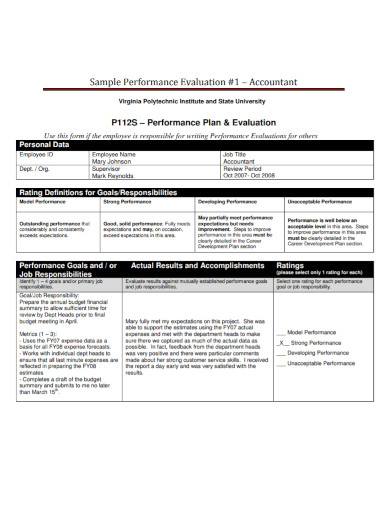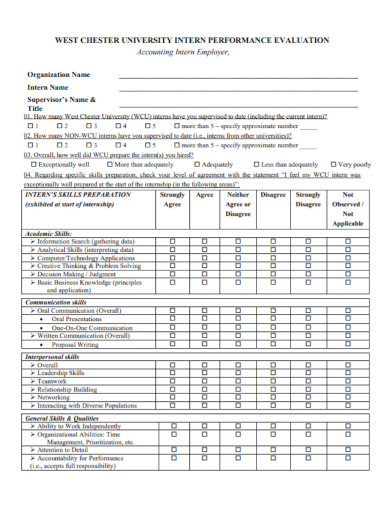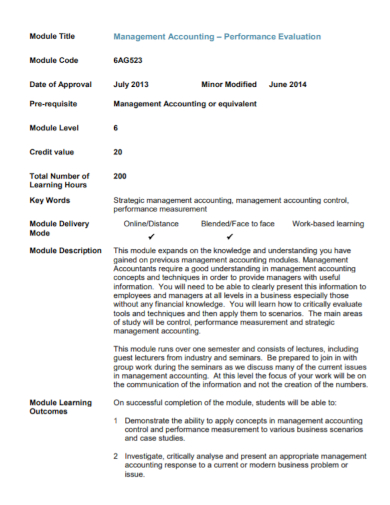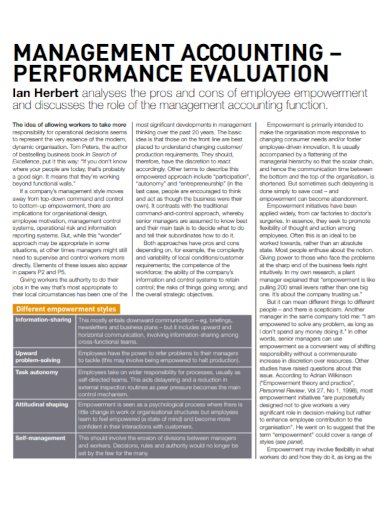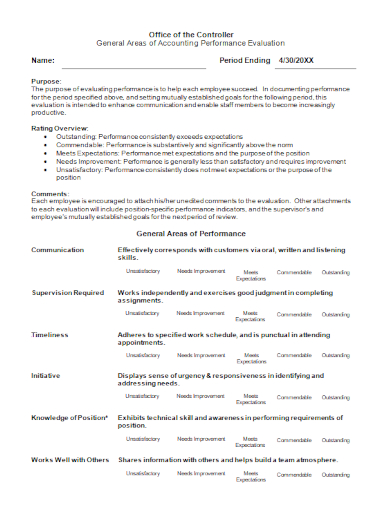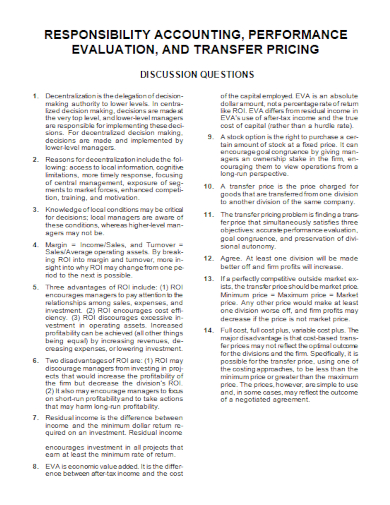One of the backbone of a business organization is the finance department. They are responsible of handling one of the most important component that keeps a business afloat which is the revenue. Handling financial reports, statements, documents and all other accounting procedure helps track the financial situation of a company. This does not only apply in a business scenario, even in our day to day lives as it helps us save and control our finances. Thus, it is imperative that accounting performance evaluation are conducted to make sure that their work stays consistent and efficient. Do check out our various accounting performance evaluation samples below to give you a much better understanding about it.
5+ Accounting Performance Evaluation Samples
1. Accounting Performance Evaluation
2. Accounting Intern Performance Evaluation
3. Management Accounting Performance Evaluation
4. Sample Accounting Performance Evaluation
5. Accounting Office Performance Evaluation
6. Responsibility Accounting Performance Evaluation
What Is an Accounting Performance Evaluation?
Just like an employee performance evaluation, an accounting performance evaluation focuses on the accounting practices and task of an employee such as an auditor, financial analyst, accounts payable specialist, tax accountant and forensic accountant among others. This is a regular assessment and review of an employee’s performance on the job. Typically, managers conduct a full performance evaluation annually, with regular check-ins throughout the year. Performance evaluations should be judged against specific goals.
How to Conduct an Accounting Performance Evaluation?
The objective of every performance evaluation is to identify an employee’s strengths and weaknesses and create a plan for career development. Those who work in accounting are usually considered detail-oriented individuals concerned with accuracy and transparency. When setting goals for job performance in accounting, managers must look at performance results, efficiency and professional development. Here are some key components you can follow to create an effective performance evaluation:
1. Employee Job Description and Analysis
Go through an employee’s job description for this will provide context for your review based on their original expected responsibilities. Make sure that their current responsibilities still align with the job they are expected to do. Performing a job analysis on your accounting staff is important in determining the objective goals because you must first know the duties required for the job. Analyze the position by listing vital tasks and minor responsibilities.
2. Set Goals
Professional development is one of the goals needed for working in finance. This would pave way for career advancement and growth. Also Goal setting serves as an goal action plan designed in order to motivate and guide a person or group toward a goal. Setting these goals properly is important to closely match the requirements of the position and be attainable.
3. General Areas of Performance
There are general areas to be considered while performing an evaluation. Such areas to be tackled are as follows:
- Communication Skills: measures the effectivity to correspond with clients or other staff members, via oral, written and listening skills.
- Supervision: can work independently and exercise good judgement while performing tasks
- Knowledge of the Position and Tasks: exhibits technical skills awareness in performing requirements of the position
- Teamwork: ability to collaborate with colleagues and build solid working relationships
- Initiative: quick to identify and address concerns, impressive attention to details
- Time Management: follows deadlines and is punctual in attending appointments
4. Comparison
After establishing the job responsibilities and goals and the strength and weakness, determine the actual results and accomplishment data a along with the ratings per performance.
5. Recommendation
Lastly, after thorough evaluation it is time to set recommendations in order to improve the performance level of an employees. Propose employee trainings, developmental needs, future goals and plan for career guidance.
FAQs
What Is an Accountant?
An accountant is responsible for keeping and interpreting financial records. They prepare and analyze a company’s financial records, including data management, analysis and consultation, creation of financial statements and ensuring regulatory compliance in the company’s accounting practices.
What Is Management Accounting?
This is the process of analyzing business costs and operations to prepare internal financial report, records, and account to aid managers’ decision making process in achieving business goals.
What Is a Performance Management?
This is management tool used to evaluate and monitor an employee’s work and performance. This is accomplished by setting individual and team goals which are aligned to the strategic plan and goals of the organization.
Overall, we see the importance of an employee performance evaluation, regardless of what job or position. To be able to carefully monitor and address any concerns should an employee encounter difficulty that can affect their job performance and skills. Keeping a constant update will help not only the company grow but enhance career development.
Related Posts
FREE 10+ Scholarship Evaluation Samples [ Interview, Training, Monitoring ]
FREE 10+ Dependability Evaluation Samples in PDF | DOC
FREE 10+ Quantity of Work Evaluation Samples [ Employee, Self, Performance ]
FREE 10+ Heuristic Usability Evaluation Samples [ Website, Testing, Inspection ]
FREE 10+ Job Knowledge Evaluation Samples [ Employee, Skills, Self ]
FREE 10+ Consultant Performance Evaluation Samples in PDF | DOC
FREE 10+ Job Interview Evaluation Samples [ Teacher, Candidate, Performance ]
FREE 10+ Grant Proposal Evaluation Samples in PDF | DOC
FREE 10+ Faculty Performance Evaluation Samples in PDF | DOC
FREE 10+ Internship Evaluation Samples [ Supervisor, Self, Performance ]
FREE 10+ Resident Evaluation Samples [ Medical, Self, Rotation ]
FREE 10+ Dissertation Evaluation Samples [ Critical, Service, Self ]
FREE 3+ Front Desk Evaluation Samples [ Performance, Receptionist, Employee ]
FREE 10+ Vendor Performance Evaluation Samples in PDF | DOC
FREE 10+ Thesis Evaluation Samples [ Master, Defense, Project ]

